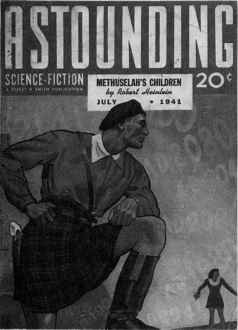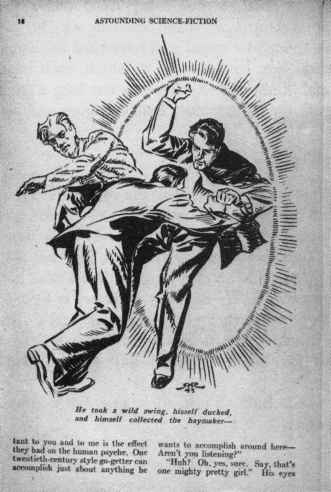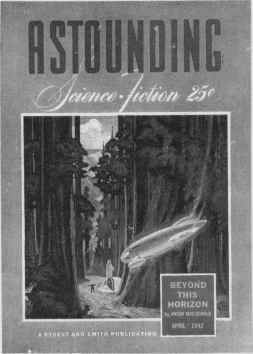Grumbles from the Grave (6 page)
Read Grumbles from the Grave Online
Authors: Robert A. Heinlein,Virginia Heinlein
Tags: #Authors; American - 20th century - Correspondence, #Correspondence, #Literary Collections, #Letters, #Heinlein; Robert A - Correspondence, #Science Fiction & Fantasy, #20th century, #Authors; American, #General, #Language Arts & Disciplines, #Science Fiction, #American, #Literary Criticism, #Science fiction - Authorship, #Biography & Autobiography, #Authorship

Or at least that seemed the setup. The answer you gave was utterly unexpected, the right answer to the wrong question, so to speak. Therein it was a seemingly pointless question-and-answer, and disappointing to the reader. At Heinlein-MacDonald 1-1/2 cent rates, I can't disappoint; alteration of either the answer—so it fitted the question the reader was asked—or of the question into a form that more evidently called for the type of answer provided, would make it click. The answer provided did make a highly interesting point, but a point overwhelmed in the rush of unfulfilled expectation of action-adventure.
In general, if you retire abruptly at this particular moment,
Astounding
is going to feel it in much the way one's tongue feels a missing tooth just after it's been yanked.
So far as going up goes, I'll agree you can't very well. I can agree with your desire to retire, under your circumstances. But look—when you don't have to, writing's a lot of fun. When you have to fill magazines, as I do, good manuscripts are godsends. Be god for a little while more, and send more, willya?
I know one thing: I'm going to get some loud and angry howls from readers.
September 19, 1941: John W. Campbell, Jr. to Robert A. Heinlein
In re your own stories. Novelettes are your meat—those and short serials, which will be, under the new setup, short novels complete in an issue. You need elbow room to develop the civilization background against which your characters act. I know that, and have suggested shorts to you mainly when I was kinda desperate for short stories that couldn't be smelled before opening the book.
September 25, 1941: Robert A. Heinlein to John W. Campbell, Jr.
I think I've got it. Darned if I don't think so. The serial, I mean—the one I've been looking for ["Beyond This Horizon"].
Like this—for some time I've been wandering around in a blue fog, trying to get a theme, a major conflict suitable for a novel-length S-F story. I wanted it to be fully mature, adult, dramatic in its possibility—and not used before. Naturally, the last requirement was the sticker. Perhaps the possibilities in S-F have not been exhausted, but they have certainly been well picked over; for me, at least, it is hard to find a really fresh theme. But I started searching by elimination. First, I eliminated space travel. Old hat, and it tends to steal the scene from anything else. Then I assumed that the basic problems of economics and politics had been solved. Thus, in one sweep, I got rid of almost every type of story I have done up to this time.
Okay—in a world that is all peace-and-prosperity, what will men and women have left to struggle for? Problems of sex and marriage obviously, but I am not writing for
Ladies' Home Journal.
The basic problem of esthetics? Wide open for S-F treatment, and new, but the issues are subtle and it would be difficult to convince the readers that the problems of esthetics are susceptible to scientific analysis and manipulation. Same for metaphysical problems.
I seemed to be up against a dead end, when a possibility occurred to me which, while not new, has been futzed with rather than dealt with—the possibilities of genetics, and in particular, What Are We Going to Make of the Human Race? Mr. Tooker discussed it ably in the March '39 book, Stapledon has dealt with it on the grand scale in "Last and First Men," Taine-Bell suggested some possibilities in "The Time Stream," numerous superman stories have been written, and lots of stories of the mad-scientist-in-the-laboratory-creates-new-species type have been done. [Aldous] Huxley did a beautiful satire in
Brave New World,
and even Heinlein has brushed the edges of the subject in "Methuselah's Children." But it seems to me that there remains a different and in some ways better story yet to be written.

(19)
Astounding,
July through September 1941. Art by Hubert Rogers.
September 30, 1941: Robert A. Heinlein to John W. Campbell, Jr.
Herewith is a piece of utter hoke which you saw in its original form in 1939. I shortened it to fit an immediate market ready to buy it, but I am not obligated to sell it there. In its shortened form it seems somewhat improved and it occurred to me that, if you are still having trouble getting short stories "which can't be smelled before the book is opened," as you put it, this item might stand a chance. It isn't good, I know, but it may be no worse than the competition.
It is offered to you at one cent a word, under the Monroe name which appears on it, or under the name of Leslie Keith. God knows it is not worth a cent a word, but I believe that is your lowest rate. If you can't use it, place it carefully in the enclosed receptacle and bounce it back to me at once, so I can shoot it off to the low-pay, slow-pay market for which it is intended.
I suppose it is silly of me to waste time revising and selling these dogs, but this is the last of them, and it is a source of satisfaction to have disposed of all of them. And none of them took more than one rewriting, which isn't bad, since most writers do two drafts in any case.
Tomorrow I start revising "Creation Took Eight Days" ["Goldfish Bowl"], which
won't
take me eight days and will leave two whole months for the serial. I've continued research every day and have a stack of notes
that
high. I'm going to like this serial, I think.

(21)
A scene from "By His Bootstraps,"
Astounding,
October 1941. Art by Hubert Rogers, an artist closely associated with
Astounding
and with Heinlein's works.
October 1, 1941: John W. Campbell, Jr. to Robert A. Heinlein
Re "By His Bootstraps." It's taking first place away from "Common Sense" . . . "Bootstraps" is not hack; it's the first all-out, frank attack on the circle-of-time story. It's a magnificent idea, and it's been worked out beautifully. You've taken a minute, but highly intriguing point in the whole theory of time-travel, and built it up to the proportions it deserved. Reasons it's good, among others: you follow the thoughts of each of the several returns of Wilson, showing why he did, each time, say what he said, though he might well have tried to change from his remembered speech. You have a story in which, each time, the man from the future who knows more, says, "It's too long a story to explain," and brushing off the explanation, both intrigues and annoys the reader—and makes him like it.
October 4, 1941: Robert A. Heinlein to John W. Campbell, Jr.
I have been beset by insomnia while trying to get the serial started, and was forced last night to the expedient of twin beds and barbiturate. Under the influence of drugs I was awake only three times in the night, but got over eight hours sleep, by damn, and feel fine today. But serial still looks hopeless. The idea is grand, wonderful, and I see more interesting angles to it every day. But each day it looks a little more impossible to work out than the day before—for pulp. The events would take place with such geologic leisureliness. And there are other difficulties, which will be obvious to you. I don't know—I don't know.
. . . "By His Bootstraps" is still hack—a neat trick, sure, but no more than a neat trick. Cotton candy.
CHAPTER II
BEGINNINGS
October 16, 1941: Robert A. Heinlein to John W. Campbell, Jr.
I can write my own story with great speed when I start, but I am not yet satisfied as to the central conflict. I have several different central problems in my mind, any of which would make a story, but as yet do not have one which fully satisfies me. I want this story to be high tragedy rather than horse opera—full of gore and action as a Greek tragedy, but tragedy in the Greek sense. (Necessarily a tragedy, because wisdom required to control genetics wisely is superhuman, and I'm no superman.)
Editor's Note: As the use of working titles was frequent, titles of stories are not always given. Now and then a final title to a story was affixed by the author, but, more often, the editor changed the title before the story saw print. It would only cause confusion here to show all the title changes some stories went through.

(24)
"Beyond This Horizon," by "Anson MacDonald,"
Astounding,
April and May 1942. Art by Hubert Rogers.
November 9, 1941: Robert A. Heinlein to John W. Campbell, Jr.
Here are the first ten thousand words of the current struggle ["Beyond This Horizon"]. Confidentially, it stinks. But I am and have been doing my goddamndest to turn out printable copy for you. My worst trouble is to get enough illustrative action into the story and to keep it from bogging down into endless talky-talk. I have stacks of notes on this story, more than twice as much as on any story I've ever done; the ideas it suggests really interest me—but I am finding it hard as hell to beat a story out of it.
But I am turning out copy and will continue to do so, at about two thousand words a day or more. Those spots on the right margin are my blood, a drop per line.
November 15, 1941: Robert A. Heinlein to John W. Campbell, Jr.
Here is another hunk of hack ["Beyond This Horizon"]. I think it well to let you see it in weekly chunks, as I am by no means confident of its quality and would like for you to look it over and comment on it as I turn it out. Then, if you get any brainstorms, I can incorporate them without delay. You appear to think better of this yarn than I do. I think it is going to require a
deus ex machina
to give the ending any real oomph—in my present sterile state of mind you may be elected
deus.
December 2, 1941: Robert A. Heinlein to John W. Campbell, Jr.
I believe I am correct in assuming that required revisions and corrections can wait until I get to New York. Most of the changes, if any, would need to be made in the second installment. I think I have ducked around the taboos sufficiently; compare this story ["Beyond This Horizon"] with any issue of
Ladies' Home Journal
—this story is much more discreet than the stuff now printed in domestic magazines. I remember a story in Street and Smith's
National Magazine,
in which the hero scrubs the heroine's back—both raw. Me, I did not even suggest that sexual intercourse was an old human custom, and you can search the yarn from end to end without finding any reference to anatomical details.
I
did
include a scene involving telepathy with an unborn child—you suggested it. But I kept the mother off stage. I don't think there is a leer in the story. Lots of boy-meets-girl and some will object to that, but, dammit, there
had
to be—if the story was to be at all true to life.
December 8, 1941: John W. Campbell, Jr. to Robert A. Heinlein
I never meant to give you a feeling of extreme urgency. Perhaps your interpretation—your personal emotional index—of "desire" comes closer to my intent than "need." Partly, that can be due to the situation best expressed this way: I need—in the sense of "must have without fail"—some tall stories. I need manuscripts. I desire some tall stories from you; I ardently desire manuscripts of the quality you produce.
(Curious—you and I each possess a vocabulary of perhaps 300,000 words, with a pretty fair ability to distinguish between the shades of meaning involved. And I can't quite adequately express the exact tone and intensity of value of the basic thought "I want you to write stories for
Astounding.")
